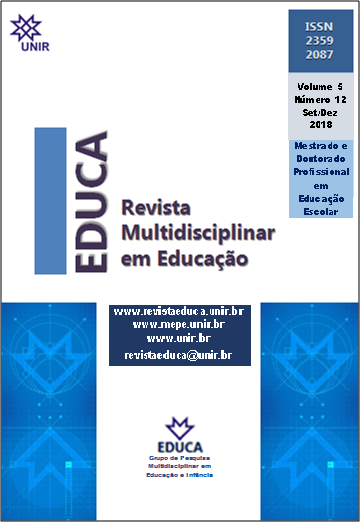Internships' pedagogical intervention proposals for the teaching of biology in public schools of Porto Velho
DOI:
https://doi.org/10.26568/2359-2087.2018.3226Keywords:
Pedagogical intervention. Didactics. Internship. Biology.Abstract
This article aims describing and presenting the schools students' impressions about an interdisciplinary movement carried out by the Biological Sciences Course, at Federal University of Rondônia, between Didactics and Supervised Internship disciplines, which culminated in eleven pedagogic interventions in public schools of Porto Velho. The interventions were based on the epistemological-methodological perspective defended by Magda Damiani and collaborators, whose objective is to generate knowledge for the practical application and/or directed to the overcoming of specific educational problems. These researchers defend the use of intervention term to denominate educational research associated to changes in pedagogical processes, based on a theoretical reference and with the purpose of potentiating these processes, evaluated at the end. Five interventions captured the school students' (from the internships' classes) impressions, collected through questionnaires and analyzed through discursive textual analysis. The schools students' impressions on the didactic proposals indicated: 1. positive reception of the practical classes and of the different didactics proposed by the college internships; 2. motivation to participate in science fairs and environmental awareness activities. The results corroborate the authors' defense concerning the importance of didactic diversity in Biology classes to arouse students' interest and promote meaningful learning.
Downloads
Published
Issue
Section
License
Autores que publicam nesta revista concordam com os seguintes termos:
a) Autores mantém os direitos autorais e concedem à revista o direito de primeira publicação, com o trabalho simultaneamente licenciado sob a Licença Creative Commons Attribution que permite o compartilhamento do trabalho com reconhecimento da autoria e publicação inicial nesta revista.
b) Autores têm autorização para assumir contratos adicionais separadamente, para distribuição não-exclusiva da versão do trabalho publicada nesta revista (ex.: publicar em repositório institucional ou como capítulo de livro), com reconhecimento de autoria e publicação inicial nesta revista.
c) Autores têm permissão e são estimulados a publicar e distribuir seu trabalho online (ex.: em repositórios institucionais ou na sua página pessoal) a qualquer ponto antes ou durante o processo editorial, já que isso pode gerar alterações produtivas, bem como aumentar o impacto e a citação do trabalho publicado (Veja O Efeito do Acesso Livre).



